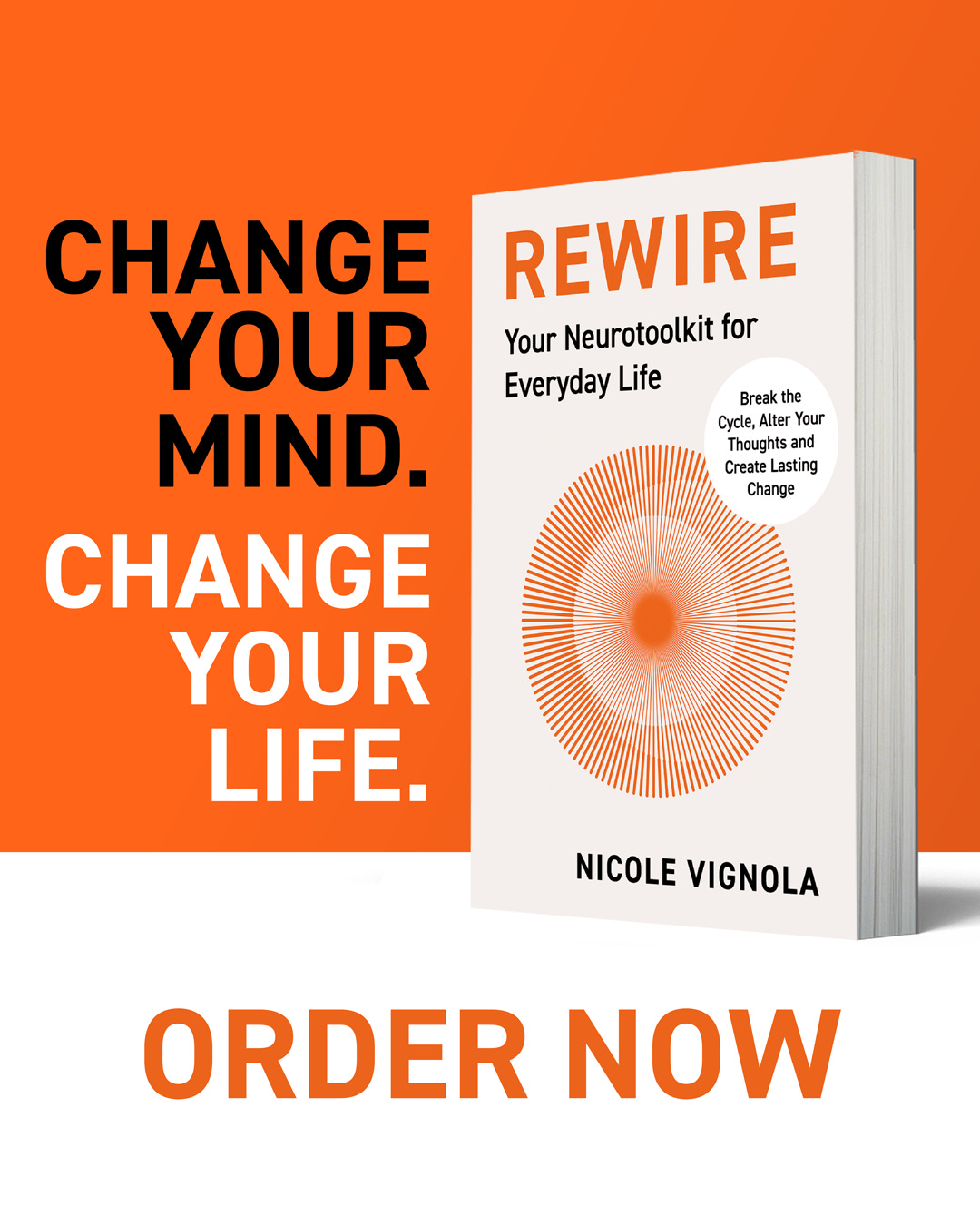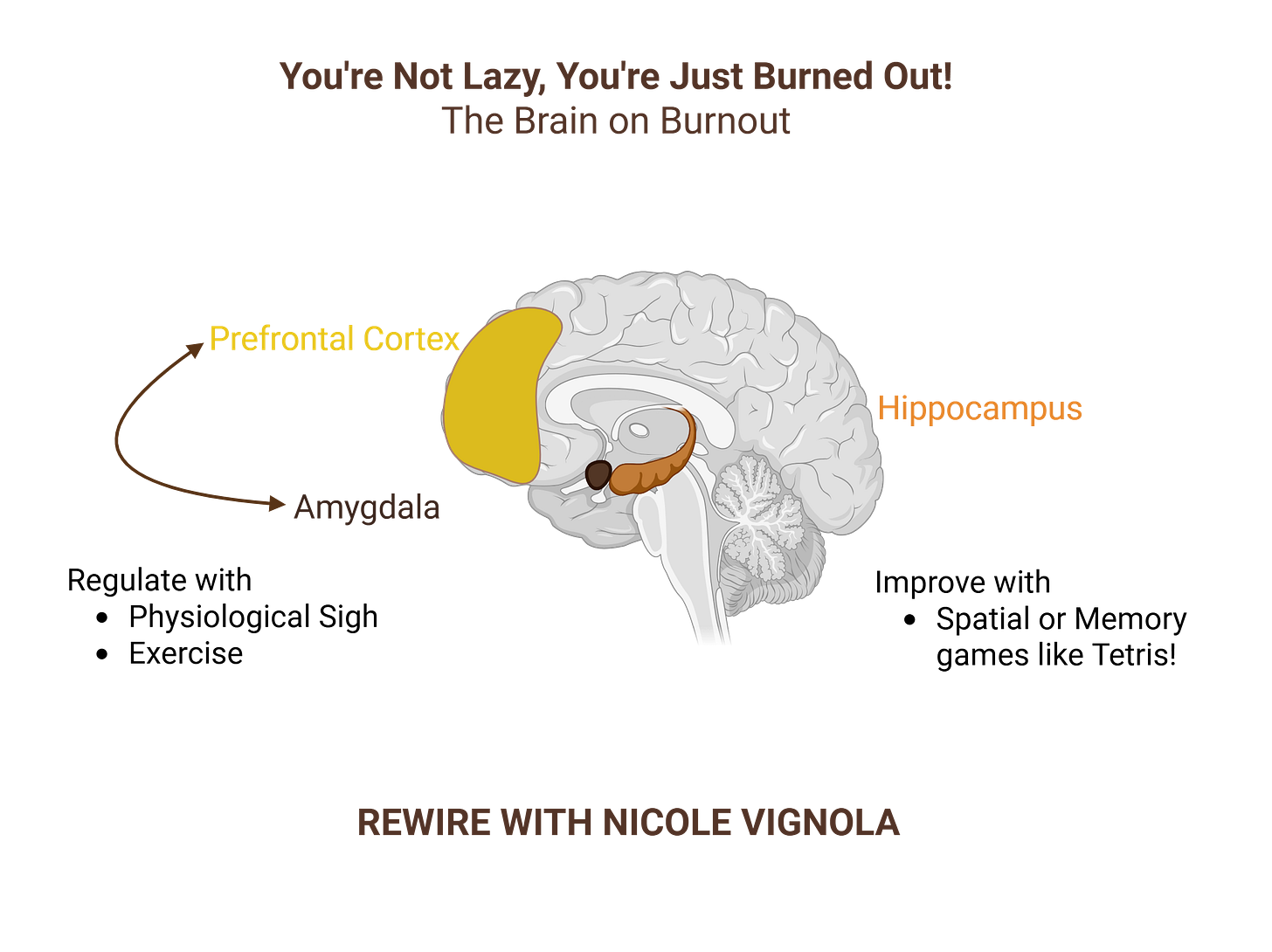From Burnout to Balance: A Brain-Based Recovery Guide
Hey Rewire Collective!
Welcome to this week’s newsletter. We’re jumping into the neuroscience of burnout and how we can recover from it using science!
What is Burnout?
Burnout is a syndrome caused by chronic workplace stress that has not been managed. You may be feeling exhausted, negative or cynical about your job, distanced from your job, and less effective at your job (1). Chronic stress changes the brain, so if you’re feeling burnt out, cut yourself some slack. Your brain literally cannot be functioning as it once did.
Now, how can we recover?
Regulate First, Solve Later
When you’re chronically stressed, your brain is in threat-seeking survival mode. Your sympathetic nervous system becomes active, getting your body ready for ‘fight-or-flight’. Adrenaline is released and your heart rate and blood pressure spike (2). Any reminder of the stress, even if you’re not at your workplace, will put you straight back into that elevated state of alertness. And when you’re in this state of constant stress and your brain becomes survival-focused, any ‘higher-order’ brain functions, like planning, organising, time-keeping, go out the window.
Chronic stress causes functional and structural changes of the prefrontal cortex, amygdala, and hippocampus (3). The prefrontal cortex is in charge of planning and organising, the amygdala is in charge of fear response and emotions, and the hippocampus is important in memory. So, changing the function and structure of these brain regions is the perfect mix for nervous system dysregulation.
Therefore, we need to start by regulating our nervous systems.
Shift on the Parasympathetic Nervous System
Take a deep breath. Take a little bit more. Let it out through your mouth. This is the physiological sigh, and this type of regulation is known as bottom-up regulation (4). This is where we use the body to calm itself through different feedback loops, without conscious control. Another strategy for bottom-up self-regulation is exercise (5, 6).
Top-down regulation is like talking yourself out of the stress. Unless you’re really experienced at doing this, it’s generally not going to work. If this is a practice you want to learn, then cognitive behavioural therapy is one way to go about it (7). But even CBT combines this narrative-shifting internal approach with bottom-up relaxation techniques.
Once we get some self-regulation going, our amygdala will calm down and our prefrontal cortex will start to come online a bit. Great! But I also said the hippocampus is affected by chronic stress. How can we actively recover it?
Tetris for the Win
In a study where people were held in a stressful moment, awaiting exam results, Tetris allowed them to disconnect from the stress, switch on a ‘flow’ state, and reduce their worry and negative emotion (8).
This helps your brain continue working, but in a way that disconnects from the stress. It helps your brain shift from survival mode to ‘oh, okay, I might be safe.’ It doesn’t have to be Tetris, but any mental game that you find a bit challenging to engage your focus, get your hippocampus going, and help you forget about the stressful situation.
One Last Problem, Motivation is Gone!
Burnout puts you in survival mode, so the motivation to brush your teeth is not going to be there.
While we wait for our nervous system to be a bit more regulated, we need to make sure our narrative shifts to congratulating ourselves for small wins. You might be used to having really long to-do lists and completing them all in one day. But if you’re burned out, you’re simply not in a place to do that. So, if you tick one thing off of your to-do list, it’s a win.
Shame and guilt don’t make us feel good. They’re wasting energy. Encouragement and congratulations will make us feel good, and slowly help our motivation come back (9).
If you liked this newsletter, checkout my YouTube where I cover Burnout and more!
Until Next Week,
Nicole x
P.S. Leave topics that you want covered in future newsletters in the comments!
References
https://www.health.harvard.edu/staying-healthy/understanding-the-stress-response#
https://www.sciencedirect.com/science/article/pii/S014976342100511X
https://samples.jblearning.com/9781284180725/9781284146448_FMxx_Seaward.pdf
https://www.derbyshiremind.org.uk/news-activities/sam23-cbt-techniques-to-manage-stress/
https://www.sciencedirect.com/science/article/pii/S1469029208000642




❣️❣️❣️